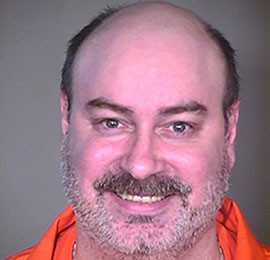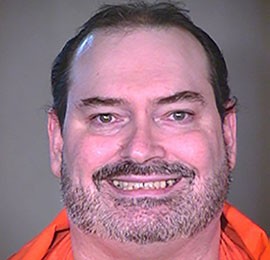Cronkite News has moved to a new home at cronkitenews.azpbs.org. Use this site to search archives from 2011 to May 2015. You can search the new site for current stories.
Court upholds death sentences in Grasshopper Junction murders
WASHINGTON – A federal appeals court Monday upheld convictions and death sentences for two brothers in the 1991 slayings of a pair of store owners in Grasshopper Junction near Kingman.
A three-judge panel of the 9th U.S. Circuit Court of Appeals rejected a range of arguments from Roger and Robert Murray, who claimed they had inadequate representation and that prosecutors improperly removed two potential jurors in their trial, among other claims.
It was the latest turn in a case that at one point saw Roger Murray raising 56 claims on appeal. In this appeal, Roger raised 10 claims and Robert raised four, all of which were rejected by the same three-judge panel in separate opinions.
Attorneys in both cases could not be reached for comment Monday on the court’s rulings.
The case began early on May 14, 1991, when a customer who stopped at the Grasshopper Junction restaurant and store operated by Dean Morrison and Jacqueline Appelhans noticed the door open, the cash register moved and money on the ground. She went to the nearby house, where the door was also open, and found Morrison, 65, and Appelhans, 60, lying face-down in their bathrobes, both shot multiple times in the head.
At least three guns were used, according to court documents: a shotgun and a .38-caliber and .22-caliber gun. The house had been ransacked and money taken from the store, although Morrison’s wallet, with $800 in it, was untouched.
A Mohave County Sheriff’s Department detective identified four sets of footprints – two belonging to the victims, one from someone in tennis shoes and another in “Western-style” boots. The prints indicated that Morrison had fought back against his attackers.
That same day, a police officer on Interstate 40 near Holbrook tried to pull over a Ford Tempo with Alabama plates after a check on the plates linked the car to suspects in an Alabama assault and robbery. But the car took off, leading police on a high-speed chase that only ended when the car ran into a ditch.
During the chase, the occupants of the car tossed out weapons that were later found to match guns used in the Grasshopper Junction killings, according to court documents.
Police found the Murrays in the car with bullets that matched the killings as well as cash and keys from the gas station, a blood-soaked pillow, and with blood on their clothes that could have come from the victims. Robert was wearing boots and Roger was wearing tennis shoes that were consistent with the footprints at the crime scene.
The brothers were charged with the murders of the two victims and the robbery of Morrison. They were tried together and convicted on all counts, then sentenced separately to death on the murder charges.
In their latest appeals, the Murrays claimed that prosecutors improperly dismissed two prospective jurors because they were Hispanic. They also claimed that their attorneys were inadequate for failing to press claims of dysfunctional childhoods and, for Roger’s attorney, for nodding off during part of his trial.
Roger also challenged the judge’s refusal to move the highly publicized trial to a new location, to give the jury instructions on possible intoxication contributing to the crime for refusing to let his attorneys visit the “sanitized” crime scene more than a year after the shootings, among other appeals.
Lower courts had rejected all of the claims, and then some, and the appellate panel did likewise Monday. One of the opinions pointed to the “mountain” of evidence linking the brothers to the crime.
“As we have recounted in the facts, the evidence against Murray was overwhelming,” wrote Judge Jay S. Bybee in Robert Murray‘s case.
Judge Johnnie Rawlinson wrote the companion opinion in Roger Murray‘s case for the same three-judge panel of the appeals court.








